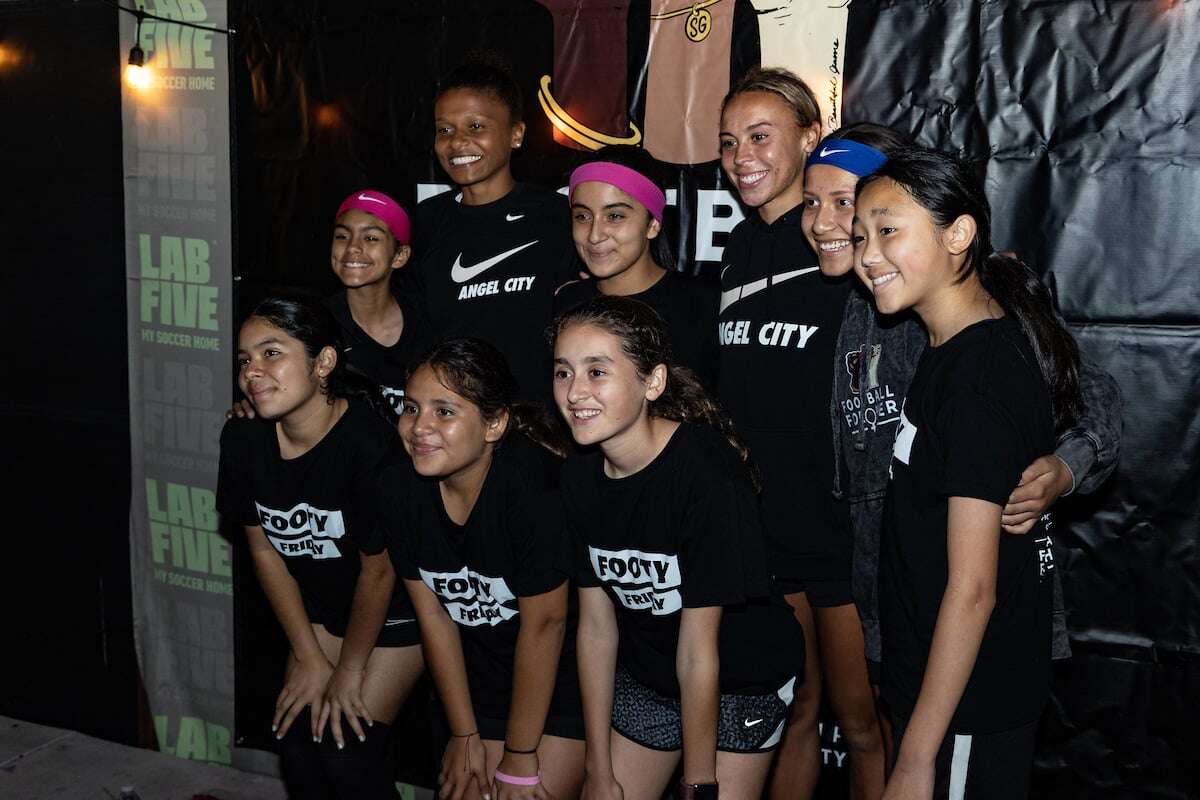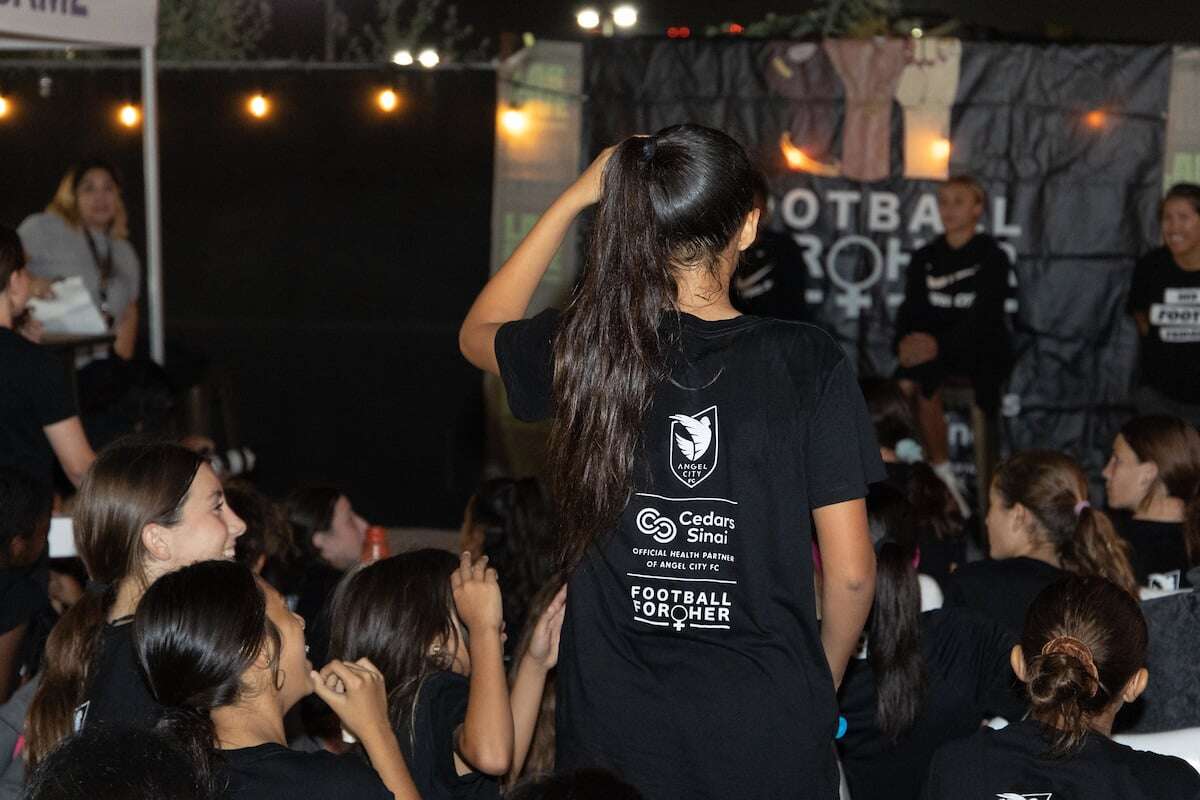.png?width=520&height=294&name=IMG_2277%20(1).png)

When Shawna Palmer played soccer growing up, it wasn’t because she wanted to go pro. The idea didn’t even occur to her, she says, until her freshman year of college.
“I played the sport because I loved it,” she says. “Not because I understood how everything worked, or I saw somebody on the national team that I was trying to be like.”
That love for the game, without regard to advancing through the ranks or earning scholarships, is the animating force behind Football For Her (FFH), the nonprofit that Palmer—now a retired professional—founded in 2019. It’s also an ethos that exemplifies the commitment of Angel City’s official health partner, Cedars-Sinai, to empowering women, families, and youth to put their health first. Supporting healthy living by expanding access to sport is a major piece of that commitment.
That commitment, which is shared by Palmer and ACFC, is in the air at FFH’s weekly pickup series, Footy Fridays. The event takes place at Lab Five Soccer, an outdoor futsal facility tucked away in a quiet residential neighborhood in Pacoima.
On this warm summer evening, there’s a festival vibe: the parking lot is overflowing with kids and their families, music is bumping, and a street vendor hawks duros and paletas. The teams on the first two fields stand out: all the players are girls and nonbinary kids. A majority, around 85%, are children of color. This is Palmer’s vision, come to life.
“I'm trying to provide opportunities I never had growing up,” she says. “For them to have a space that's consistent, where they're around other girls and other women that look like them.”
Every Friday, a few dozen girls and gender-expansive youth converge here to play soccerand hang out with their friends. It’s such a simple thing, but according to Palmer, “it's more impactful than I even know. I don't even realize it until I get pulled aside by parents.”
First, Palmer takes the kids through a quick group warmup, then groups them by age and splits them into teams. From there, it’s good old-fashioned pickup: five minutes, winner stays (for up to two games in a row). A group of female coaches referee and help run the show. There’s plenty of laughter in the crowd, but on the field, things are competitive. One girl of about 14, in a move that would make Christen Press proud, smoothly cuts past a defender and sends in a rocket with her right foot. Off the post—this time.
Supporting FFH is just one of the ways Cedars-Sinai is advancing their commitment to leveling the playing field for underrepresented communities. Through their partnership with ACFC and the Play Equity Fund, they also support the Girls Academic Leadership Academy’s sports program, and Girls Play LA’s soccer program for girls and nonbinary youth.
The Girls Academic Leadership Academy is a rigorous college preparatory school for girls in grades 6–12. The school emphasizes achievement in STEM fields, with an eye towards giving LAUSD students a clear pathway to college. Through their partnership with Angel City, Cedars-Sinai is supporting the school’s athletics programming, focusing on soccer.
Girls Play LA (GPLA), meanwhile, is a program focused on providing girls in underserved communities with access to sports. Cedars-Sinai partners with GPLA on their soccer program at the Expo Center, which eliminates economic barriers to participation for dozens of girls and nonbinary youth.
The FFH space is noteworthy—and, unfortunately, unique—in multiple ways. First, says Palmer, there’s a serious need for women coaches in youth soccer. Things have gotten better since she was growing up, when women in the coaching ranks were almost unheard of, but there’s still a gap. It’s something she saw firsthand when she was doing individual coaching after retiring as a pro.
“I was again getting a lot of clients just because I was female,” she says. “They didn't care about my credentials, they didn’t know I played professionally. People just said, ‘I want you to train my daughter because you're a female.’”
Access to female mentorship—and to a safe environment where girls and nonbinary kids can be themselves—is vital. Dozens of parents have told Palmer how important this space is, but she recounts an especially stark illustration: one girl had been acting withdrawn, and eventually told her mom that her male club coach had made an insulting comment about her body.
“It completely shot her confidence,” Palmer remembers. Footy Friday helped build her back up. “Providing a space for these girls to feel comfortable and empowered and get their confidence back, just by having fun in a positive environment—it’s a lot.”
Another important facet of the program is the fact that so many participants are Latina or other youth of color. That’s a big deal in youth soccer, which—despite the enormous popularity of soccer among Latin Americans—has long been seen as white, affluent, and suburban. Palmer, whose mother is Vietnamese, remembers that growing up, she never had the opportunity to see herself in her adult mentors. She's been able to change that for a lot of kids.
Finally, there’s the issue of literal space. “Field space is very, very limited,” she says. “It's almost nonexistent in Los Angeles. Where it does exist, you have to pay or jump fences.”
That means that kids whose parents can’t afford to put them in club soccer—which is often very expensive—get squeezed out. “You can't get this atmosphere unless you pay for a team,” she says, gesturing at the turf field behind her. “It's not a basketball court. Soccer fields aren’t up everywhere. Unless you're paying to be on an organized team, you can't play any organized games.”
The inequity Palmer is working to address exists in all youth sports—both for girls and gender-expansive youth, but also children of color and those living in poverty—is a major issue. Many schools are cutting PE and sports budgets, and according to the LA84 Foundation, kids from households earning less than $25,000 are five times less likely to participate in sports. Latina girls have the lowest participation rates.
These issues are also the focus of Cedars-Sinai’s involvement in the Angel City sponsorship model, where 10% of their sponsorship commitment is allocated to community organizations to affect change in Los Angeles. Through a partnership with the Play Equity Fund, Cedars-Sinai and Angel City FC are supporting Football For Her’s Footy Fridays, Girls Leadership Academy’s sports program, and Girls Play LA’s soccer program for girls and non-binary youth.
Since the early days of Angel City, Cedars-Sinai has supported the club’s vision of community support. Cedars-Sinai was also the first official partner of ACFC’s annual competition, Copa Angelina, where Angel City took on the Mexico Women’s National Team. Their partnership with Copa Angelina follows the Angel City model of allocating 10% of sponsorship dollars to community projects. Cedars-Sinai’s interest in the cup stemmed from a pledge to bring world-class care to patients wherever they may be, in their many locations throughout Los Angeles and through their partnerships in Mexico City and beyond.
That’s also central to Angel City’s mission of uplifting women, girls, and gender-expansive individuals through sport. “For me to be able to provide this space in 2019,” says Palmer, “not knowing there was even going to be a professional team here, and now there's Angel City—for me, it's full circle. I cried the first game. And the second game. I never had that [growing up].”
In addition to pickup games, Footy Friday also features a rotating slate of non-soccer-related activities like journaling and games. Small-group sessions with coaches offer one-on-one mentorship time. “Some parents tell me, ‘what I love the most is the social aspect for my child’,” says Palmer. “When they're all sitting out, playing games, eating tacos. We've created this really cool community of people.”
FFH’s reach doesn’t end with this event, either: it also puts on clinics, beach cleanups, back-to-school events, and virtual summits featuring guest speakers like professional players (Angel City captain Ali Riley and USWNT and Gotham forward Midge Purce have both joined), freestyle pros, and health experts. Everything is geared toward the broader mission of improving access.
Of course, it isn’t just about soccer. In a world that is too often unwelcoming or outright hostile to girls, trans kids, and kids of color, spaces where those young people can simply exist, without having to hide or apologize, can be lifesaving. As it so often is, soccer is just what brings people together.






